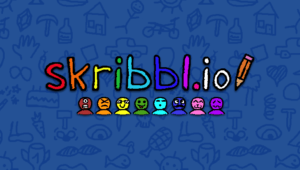
For this Critical Play, I chose to play skribble.io, a web app created by @ticedev. This game seems to be aimed at users who want to pass time with friends, kill time with strangers, or draw random prompts. It supports groups of either chosen or random players of up to 12.
The game functions on a series of timed rounds in which a player is chosen at random to draw a word which they see but the rest of the players cannot see. The rest of the players must guess the word based on what the player is currently drawing as well as a number of spaces that the letters of the word/phrase take up, which slowly fill in as the timer runs out. The drawer is awarded points based on how many people guess their drawing correctly, and the guessers are awarded points based on the order in which they guess the word correctly.
Additional mechanics include a chatbox, which notifies all players when a player has correctly guessed the word (“<player> has guessed the word!”) or incorrectly guessed it (“<player>: incorrect guess”). Also, players can collectively vote to kick a player off if they are playing the game unfairly by writing the word instead of drawing or using a drawing robot, and they can also upvote and downvote the quality of players’ drawings using like and dislike buttons. The player with the highest score wins the game.
The game created both expressive and competitive fun. The drawing aspect of the game was very expressive, and the game provided you with many tools like fill buckets, colors, and brushes of various sizes to be as expressive as you wanted or were able to be. On the guessing side, there was also a lot of incentive to guess quickly and accurately. Since everyone saw your incorrect guesses, you were incentivized to be more careful and accurate instead of quickly typing random guesses. Also, since players saw your drawing as you drew it, you had to guide your drawing to be more forward and direct so that they could guess it before time ran out.
I think the game works for its simple design and easy access. Players can join any time, and they will always be matched with an ongoing round and instantly will be able to play. However, this means that players who join later in the rounds will never be able to catch up to players who were there from the beginning, which can lead to imbalanced games where some players are guaranteed to win. I think this game could be improved with a short waiting room so that all players can start from the same position.
I also felt that this game did not disincentivize cheating or foul play very well. In many of the random rounds I played, people used auto-drawing bots that filled in the screen with perfect reproductions to win the game. Also, I think that misspelled or “close enough” guesses should be accepted, since many times these misspelled guesses gives the answer away unfairly to other players when they are displayed.
This game is essentially the same as Pictionary, but online and randomly matched, with the added chatbox features. I think it is worse than Pictionary, because Pictionary uses social pressure and in-person dynamics to encourage fair play and fun inside joke-making. This game, like many .io games, felt aggressive, with racial slurs, cheating, and unfair play everywhere.
As far as vulnerability goes, this game allowed you to be as vulnerable or as closed-off as you wanted to be. The guessing words were very generic and did not invite very vulnerable drawings, but I’m sure that in a private game with friends you could develop fun inside jokes and more personal drawings to react to each word.



